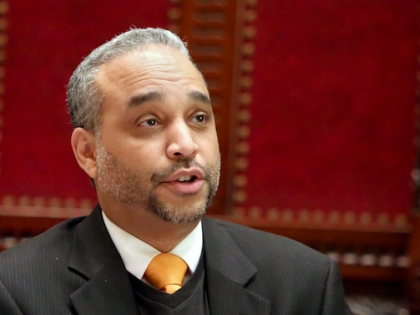
Senator Peralta Says Fight To Claim Roosevelt Is Just Beginning
For decades, prostitution has plagued the neighborhoods of Jackson Heights and Corona in western Queens – with some authorities dubbing the area the new Times Square.
The borough ranks No. 1 in prostitution arrests in the city. Of the 3,229 prostitution-related arrests citywide last year, 1,474 were made in Queens, according to arrest statistics from the New York State Division of Criminal Justice Services.
The 115th precinct — which covers Jackson Heights, Corona and East Elmhurst — accounts for the largest portion of those arrests.
The precinct made 316 prostitution-related arrests in 2010. Roughly 70 percent of those arrests were men patronizing prostitutes.
Nightlife Thrives on Roosevelt Avenue
On a recent Friday night, the bar-lined block of Roosevelt Avenue was teeming with nightlife. The main artery in Western Queens is dotted by Colombian bakeries, beauty salons, Mexican restaurants and bars like the Gentlemen’s Club advertising beautiful female dancers.
Often, people along this stretch of road hand out business cards emblazoned with half-naked women that advertise “Free Delivery” and typically list the hours of operation as between 10:30 a.m. and 2:30 a.m., according to State Senator Jose Peralta.
Peralta said he believes the cards are marketing tools of brothels that have set up shop inside private homes and apartments. In February, he introduced the so-called “chica card” legislation, making it illegal to hand out such cards.
Soon after the legislation came out, the cards stopped littering the streets -- but it was only a partial victory, he said.
“I mean they’re still advertising prostitution, but now what you see is more of these pictures of flowers and fruits,” Peralto said, sitting in the passenger seat of a Toyota Camry along Roosevelt Avenue. “But at one point what we saw was graphic nude pictures of women … and that’s what was littering the streets of Roosevelt Avenue where the kids were picking this up.”
The law banning the cards goes into effect in November.
A Profile of Life on the Streets
On 104th Street in Corona, $2 dance bars dot the side streets. Each time doors open, Latin music flows out while bouncers guard the doors. The bars are throwbacks to the dance halls of decades ago where lonely servicemen would go to find companionship.
"We’ve heard from women there is sex going on in some of the bars,” said Nathaly Rubio-Torio of Voces Latinas. “And if you walk along Roosevelt Avenue, you’ll see that at night you can’t see inside the bars.”
Rubio-Torio said her group – which runs an HIV prevention program -- had been visiting the bars along Roosevelt Avenue handing out safe sex packets when a bar owner complained that customers weren’t happy with the female condoms being used and asked her not to come back.
“So if this is a bar what does it matter? But he asked us not to come in because they were losing customers,” she said.
Alejandra Trevino, who attends a support group run by Voces Latinas, sought help because of domestic violence but eventually revealed her history as a prostitute.
At her request, Trevino’s name has been changed to protect her privacy. Although she’s been out of the business for four years, she fears that if she’s recognized, her family in Colombia will be harmed.
Trevino, 48, said within a week of arriving in New York, a woman who allegedly lured her to the city told her she’d be cleaning offices along with three others. But once she arrived, she said she was driven to a secluded area that she believes was Long Island.
“I asked, ‘Where are the offices?’ because all I see are trees,” Trevino said.
She said the woman gestured to the van they had been following and said that was the office.
“In the van was a mattress thrown on the floor and I said, ‘This is the office? And I’m going to clean here?’ And she said, ‘Yes.’ And I said, ‘What am I going to clean?” Trevino said.
That night, she said she was with 52 men.
At first, Trevino said she cried and protested, but the woman threatened to leave her there. Feeling that she had no choice, she gave in.
She said the money she made went to the woman for rent, food and for paying off debts in Colombia. Trevino said most of the men paying for sex were Latino immigrants from places like Guatemala and Mexico.
In the city, the going rate was $50 for 15 minutes. In the suburbs, the price dropped by $20.
The former prostitute said she went on to work in squalid brothels all over the city -- including in Jackson Heights where up to 25 women would work in houses with five rooms.
“Sometimes there weren’t even beds,” she said. “It was a mattress thrown on the floor or a board with something thrown over it and that’s where you’d have to work.”
Trevino says said she finally left the brothel but married a man who would beat her and forced her back into sex work.
A tearful Trevino said she saw girls as young as 12 working at brothels across the city.
Another Bill to Help Curb Prostitution
Rubio-Torio said young immigrant women who are undocumented often see cleaning houses and bar work as their only job options, especially in a down economy. Not speaking the language and not knowing anyone leaves many women vulnerable to being victims of sex trafficking.
Peralta recently introduced a bill that would require livery drivers – some of whom allegedly ferry prostitutes to customers and vice versa -- to take a course on sex trafficking before receiving or renewing a livery license.
“Because I know that if the drivers are aware of what signs to look for to see if these women are potential victims of human trafficking that they are more likely not to take them to the next destination, more likely not to deal with this underworld,” the state lawmaker said.
Peralta believes some livery drivers are shuttling men from Manhattan looking for prostitutes to Roosevelt Avenue. Others, he said, may be transporting prostitutes to customers unwittingly.
A Taxi and Limousine Commission official said singling out drivers is not the way to go and a campaign that educates the broader public would be more effective. Under the bill, the commission would be responsible for administering the course.
Rubio-Torio, who runs Voce Latinas, said a change is needed on Roosevelt Avenue because right now, only the bars thrive there. Just recently, she said, a restaurant closed its doors.
“It was a nice Indonesian restaurant, very good, couldn’t make it not even a year,” Rubio-Torio said, “Now what’s coming up? A sports bar.”
